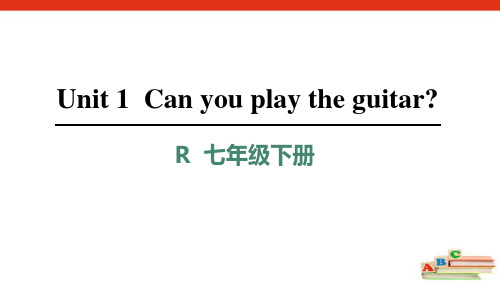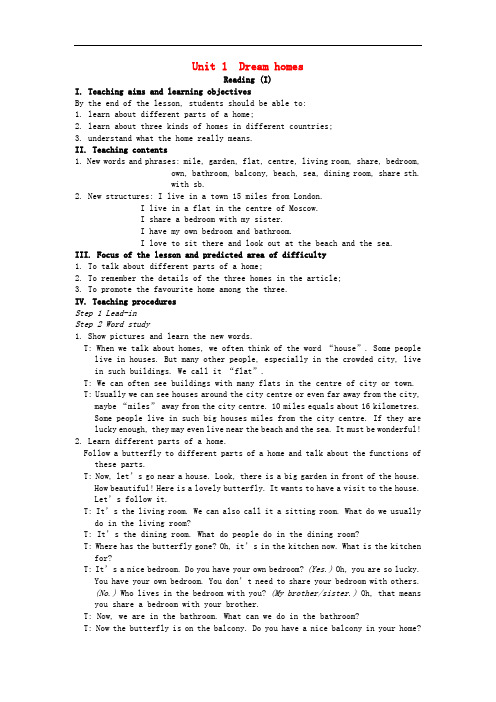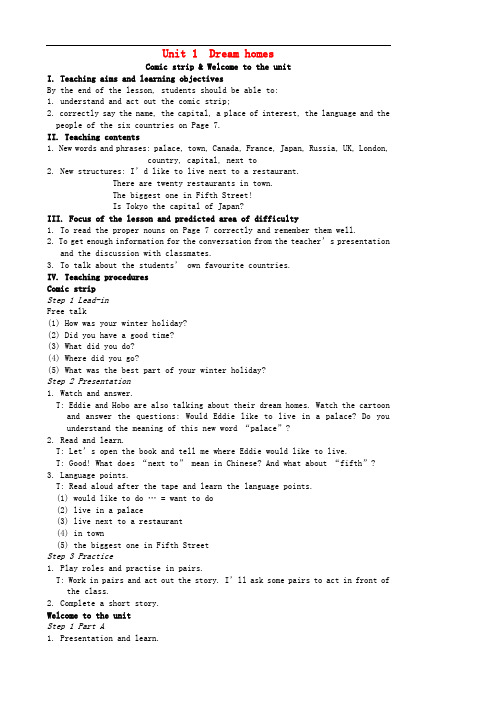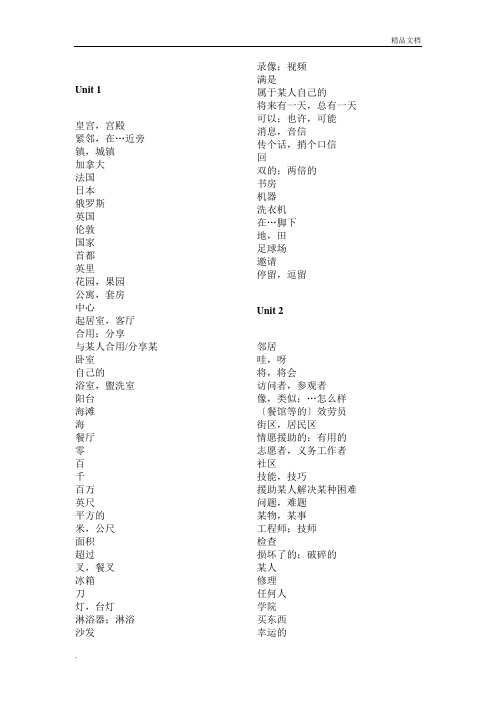苏教版英语七年级下册 第一课
七年级下册英语第一课的课件

○ — OK.
○ . buy
B. let
C. show
●C
二、汉泽英。
1. 我会弹钢琴。 _I__ca_n__p_l_a_y_t_h_e_p_i_a_n_o_._______
2. 他不会弹吉他。_H__e_c_a_n_’_t_p_l_a_y_t_h_e_g_u_i_t_a_r.____
3. 说汉语
_s_p_e_a_k_C__h_i_n_e_se_____________
4. 加入俱乐部 _j_o_i_n_t_h_e_c_l_u_b______________
5. 弹吉他
_p_l_a_y_t_h_e__g_u_it_a_r____________
6. 打篮球
_p_l_a_y_b__a_sk_e_t_b_a_l_l ___________
Jane: OK, let’s join now!
Language points
一.What club do you want to join? 你想加入什么俱乐部 ?
○ 这是what引导的特殊疑问句 ○ what作疑问词使用时,可以单独对事物进行
提问,也可以和名词或名词短语构成一个特殊 疑问短语,放在句首,构成特殊疑问句。
Role-play the conversatio n.
Bob can play soccer.
一.What can Jane do? 二.What can Bob do? 三.What club does Jane want to join? 四.What club can Bob join?
○ Jane can tell stories well. ○ Jane wants to join two clubs, the story telling club and the art club. ○ Bob can join the soccer club.
江苏省七年级英语下册 Unit 1 Dream homes(第4课时)教案 (新版)牛津版

Unit 1 Dream homesGrammarI. Teaching aims and learning objectivesBy the end of the lesson, students should be able to:1. learn about cardinal numbers and ordinal numbers;2. use cardinal numbers to describe numbers, sizes, etc;3. use ordinal numbers to describe dates, floors, etc.II. Teaching contents1. New words and phrases: zero, hundred, thousand, million, foot, square, metre,area, over, square metre, in size, have an area of2. New structures: The CN Tower is 1,815 feet tall.Women’s Day is on the eighth of March.He is always the first to come to school in our class.III. Focus of the lesson and predicted area of difficulty1. To remember all the ordinal numbers;2. To use the cardinal and ordinal numbers correctly.IV. Teaching proceduresCardinal numbersStep 1 Lead-inT: Hello, boys and girls. Let’s enjoy a number song.T: Let’s play a number game in groups of four. Say the number 1, 2, 3 … in turn. When someone meets 7, like 7, 17, or the times of 7, like 7, 14, he or she should spell it instead of saying the number.【设计意图:学生对1-20的基数词比较熟悉,可通过游戏更加深刻的复习数字,同时提高他们学习的积极性和兴奋度。
江苏省七年级英语下册 Unit 1 Dream homes(第2课时)教案 (新版)牛津版

Unit 1 Dream homesReading (I)I. Teaching aims and learning objectivesBy the end of the lesson, students should be able to:1. learn about different parts of a home;2. learn about three kinds of homes in different countries;3. understand what the home really means.II. Teaching contents1. New words and phrases: mile, garden, flat, centre, living room, share, bedroom,own, bathroom, balcony, beach, sea, dining room, share sth.with sb.2. New structures: I live in a town 15 miles from London.I live in a flat in the centre of Moscow.I share a bedroom with my sister.I have my own bedroom and bathroom.I love to sit there and look out at the beach and the sea.III. Focus of the lesson and predicted area of difficulty1. To talk about different parts of a home;2. To remember the details of the three homes in the article;3. To promote the favourite home among the three.IV. Teaching proceduresStep 1 Lead-inStep 2 Word study1. Show pictures and learn the new words.T: When we talk about homes, we often think of the word “house”. Some people live in houses. But many other people, especially in the crowded city, live in such buildings. We call it “flat”.T: We can often see buildings with many flats in the centre of city or town. T: Usually we can see houses around the city centre or even far away from the city, maybe “miles”away from the city centre. 10 miles equals about 16 kilometres.Some people live in such big houses miles from the city centre. If they are lucky enough, they may even live near the beach and the sea. It must be wonderful!2. Learn different parts of a home.Follow a butterfly to different parts of a home and talk about the functions of these parts.T: Now, let’s go near a house. Look, there is a big garden in front of the house.How beautiful! Here is a lovely butterfly. It wants to have a visit to the house.Let’s follow it.T: It’s the living room. We can also call it a sitting room. What do we usually do in the living room?T: It’s the dining room. What do people do in the dining room?T: Where has the butterfly gone? Oh, it’s in the kitchen now. What is the kitchen for?T: It’s a nice bedroom. Do you have your own bedroom? (Yes.)Oh, you are so lucky.You have your own bedroom. You don’t need to share your bedroom with others.(No.) Who lives in the bedroom with you? (My brother/sister.) Oh, that means you share a bedroom with your brother.T: Now, we are in the bathroom. What can we do in the bathroom?T: Now the butterfly is on the balcony. Do you have a nice balcony in your home?What do you usually do on the balcony?T: What a lovely butterfly! Thank you for showing us around the house.3. Complete Exercise B1 on Page 9.Step 3 Passage presentation1. Lead in three different kinds of homes around the world.T: Nowadays, many people are using smart mobile phones. They make communication much easier. For example, we often use “Wechat”to communicate with our friends.Simon has some foreign friends. They use “Wechat” to tell Simon about their homes. They are Neil, Anna and Stephen. Neil sends a video about his home. Anna sends a period of speech sounds about her home. And Stephen sends Simon some nice pictures and a short article about his home. Which one would you like to learn about first?2. Watch a video about Neil’s home and choose the right answers.T: Now, let’s watch Neil’s video and try to choose the right answers.3. Listen to Anna and answer some questions.T: Let’s go on to learn about Anna’s home. Please listen to Anna and try to answer the two questions.4. Read Stephen’s article and judge the sentences.T: Here are some nice pictures and an article from Stephen. Read and try to decide whether the following sentences are true or false.Step 4 Practice1. Read aloud after the tape.T: Please open your books and turn to Page 8. Let’s read after the tape.2. Do the question chains.T: Do you understand the passage well? Now, let’s do the question chains. Please prepare at least five questions about the three homes.3. Complete Exercise B2.4. Complete Exercise B4.5. Do a promotion.T: Now we know the three homes from three different countries very well. Which one do you like best? Why do you like it best? Show your choice and your reasons to the class.6. Emotional education.T: East or west, home is best! Big or small, Love is all!V. Homework1. Finish the exercises in your book.2. Recite or retell Homes around the world.3. Tell parents you love them and your home.【教学反思】。
江苏省七年级英语下册 Unit 1 Dream homes(第1课时)教案 (新版)牛津版

Unit 1 Dream homesComic strip & Welcome to the unitI. Teaching aims and learning objectivesBy the end of the lesson, students should be able to:1. understand and act out the comic strip;2. correctly say the name, the capital, a place of interest, the language and thepeople of the six countries on Page 7.II. Teaching contents1. New words and phrases: palace, town, Canada, France, Japan, Russia, UK, London,country, capital, next to2. New structures: I’d like to live next to a restaurant.There are twenty restaurants in town.The biggest one in Fifth Street!Is Tokyo the capital of Japan?III. Focus of the lesson and predicted area of difficulty1. To read the proper nouns on Page 7 correctly and remember them well.2. To get enough information for the conversation from the teacher’s presentationand the discussion with classmates.3. To talk about the student s’ own favourite countries.IV. Teaching proceduresComic stripStep 1 Lead-inFree talk(1) How was your winter holiday?(2) Did you have a good time?(3) What did you do?(4) Where did you go?(5) What was the best part of your winter holiday?Step 2 Presentation1. Watch and answer.T: Eddie and Hobo are also talking about their dream homes. Watch the cartoon and answer the questions: Would Eddie like to live in a palace? Do you understand the meaning of this new word “palace”?2. Read and learn.T: Let’s open the book and tell me where Eddie would like to live.T: Good! What does “next to” mean in Chinese? And what about “fifth”? 3. Language points.T: Read aloud after the tape and learn the language points.(1) would like to do … = want to do(2) live in a palace(3) live next to a restaurant(4) in town(5) the biggest one in Fifth StreetStep 3 Practice1. Play roles and practise in pairs.T: Work in pairs and act out the story. I’ll ask some pairs to act in front of the class.2. Complete a short story.Welcome to the unitStep 1 Part A1. Presentation and learn.Show pictures to learn about different countries: Japan, the USA, France, Canada, the UK and Russia.JapanT: Boys and girls, please look at the picture. Who knows the name of this place?T: Yes, it’s Mount Fuji. There is thick white snow at the top of the mountain all year round. The view in and around this mountain is really wonderful. Do you know which country it is in?T: That’s right. It’s in Japan. Mount Fuji is near Tokyo, the capital of Japan.Do you understand the meaning of “capital”?T: What do we call the people who live in Japan? Yes, we call them Japanese or Japanese people. And “Japanese”also means the language that Japanese people speak.T: We’ve learnt something about Japan. Would you please say something about this picture or this country? For example, the capital of Japan is Tokyo. Who’d like to go on?T: Good job! So much for this picture. Now, look at the next picture.2. Look and match.Finish Part A on Page 7.3. Complete and say.T: We’ve learnt a lot about different countries. Let me help you remember them well. Look at this table. First, would you please complete it?T: Would you please say several sentences about each country? You can first practise with your partner. Then I’ll ask some of you to report one of them to the class.Step 2 Part B1. Listen and answer.(1) Which picture are Annie and Simon talking about?(2) What do you know from their conversation?2. Read aloud.3. Make up similar conversations.Step 3 PracticeShow pictures of famous people from the six countries and ask the students to do the question chains. Vote for the best question and the best answer.T: I’ll show you some famous people from the six countries. Let’s do a “question chain”. Six questions for each of them. Let’s see who will raise the best question and who will give the best answer. Are you ready? OK. Let’s start from …T: Great! Most of you did a very good job. Which question and which answer do you think are the best?V. Homework1. Tell your parents about your favourite country among the six in English.2. Remember the new language points.。
七年级下册第一课英语

七年级下册第一课英语七年级下册英语课本的第一课通常涵盖了新的语法知识、词汇、短语以及对话或短文等内容。
不过,请注意,不同版本的教材可能有所不同。
以下是一个假设性的七年级下册英语第一课的示例内容:Lesson 1: A New StartVocabulary:studentteacherclassroomblackboarddeskchairbookpencileraserbackpackPhrases:be excited aboutlook forward toa new startmake new friendsDialogue:A: Hi, I'm your new classmate. My name is Alice.B: Hi, Alice. I'm Bob. Welcome to our class! Are you excited about the new school year?A: Yes, I am. I'm looking forward to making new friends and learning new things.B: Me too. Let's start this new year together.Reading Passage:It's a new school year, and Alice is excited about starting her first day at her new school. She walks into the classroom and sees her new teacher writing on the blackboard. Alice finds her desk and sits down. She takes out her book and pencil and gets ready to learn.Alice looks around the classroom and sees some familiar faces and some new ones. She is looking forward to making new friends this year. She knows that with hard work and dedication, she can achieve her goals in this new start.这只是一个示例,并不代表任何特定教材的实际内容。
苏教牛津译林版初中英语七年级下册Unit1 Dream homes3PPT课件

11th = eleventh 12th = twelfth 13th = thirteenth 14th =fourteenth 15th = fifteenth 16th =sixteenth 17th = seventeenth 18th =eighteenth 19th =nineteenth 20th = twentieth
5. Two million three hundred and two 2,000,302
6. nine hundred million eight thousand seven hundred and eight 9,008,708
¥598.00
five hundred and ninety-eight
2. 六月五号是我的生日. My birthday is on the fifth of June.
3. 这是我第三次在大海里游泳. This is my third time to swim in the sea.
4. 他住在第二十二楼. He lives on the twenty-second floor.
How do we write them
1. one hundred and twenty-five 125
2. two thousand three hundred and eleven 2,311
3. ten thousand and eleven 10,011
4.one hundred thousand one hundred and two 100,102
five hundred and sixty-seven thousand, two hundred and fifteen
苏教版英语七年级下册1-8课单词默写

精品文档Unit 1皇宫,宫殿紧邻,在…近旁镇,城镇加拿大法国日本俄罗斯英国伦敦国家首都英里花园,果园公寓,套房中心起居室,客厅合用;分享与某人合用/分享某卧室自己的浴室,盥洗室阳台海滩海餐厅零百千百万英尺平方的米,公尺面积超过叉,餐叉冰箱刀灯,台灯淋浴器;淋浴沙发录像;视频满是属于某人自己的将来有一天,总有一天可以;也许,可能消息,音信传个话,捎个口信回双的;两倍的书房机器洗衣机在…脚下地,田足球场邀请停留,逗留Unit 2邻居哇,呀将,将会访问者,参观者像,类似;…怎么样〔餐馆等的〕效劳员街区,居民区情愿援助的;有用的志愿者,义务工作者社区技能,技巧援助某人解决某种困难问题,难题某物,某事工程师;技师检查损坏了的;破碎的某人修理任何人学院买东西幸运的精品文档将,将会后天火生火经理办公室办公室职员,上班族警察邮递员公司局,所,站警察局邮政邮局人工作年纪较长的乘火车/公交车/轮船/自行车将来艺术家,〔尤指〕画家听起来生病的;恶心的布告,通知信息下面较好,更好任何事为…担忧设计,构思组,群Unit 3我的没有什么等一会儿元〔人民币单位〕罐,听比萨饼交流学生安静的;寂静的空气,大气新奇的fresh 本地的,当地的慢跑锻炼地铁知名的,著名的西方的歌剧,戏剧戏院,剧场错过,失去向前,前进盼望,期待很快,不久明信片钥匙环,圈;戒指钥匙扣你的;你们的我们的他〔或她、它〕们的她的到处,普及笔盒,笔袋金銮宝座作品,著作艺术品绘画,油画划〔船〕旅馆拥有,全部家乡友好的喂养〔使〕生长,发育;长大,长高小麦嗅,闻到驾车送〔人〕;驾驶,开〔车〕Unit 4跟随;效仿小路,小径不得不,必须北,北方西,西方南,南方东,东方旅游,旅游精品文档千米,公里每人,人人径直地向前移动,进行下去;开竹整天地沿着,顺着路,道路国王记得,记住〔用于动词、形容词或名词后引导从句〕危险的声音森林好笑的,滑稽的笑,大笑长颈鹿相当,非常脖子叶东北方桥穿过,横过笼子,鸟笼在…对面;穿过,横过在…里面在…外面在…上面在…下面指示牌在…上面长椅在另一边,到另一侧宝藏转弯处交通,来往车辆红绿灯应该,应当交叉路口拐角,街角;角落打算为…打算…大量,充足大量,足够出口银行Unit 5令人吃惊的,惊人的统一的,相同的出生,诞生停止做某事[复](用于比拟)倍地球骨头后部;背部脂肪事实和……一样通常的,平常的照例;像往常一样坐下突然低语,耳语灌木丛转身;〔使〕翻转任何人没有人,无人答复,答复奇异的;陌生的离开迅速地,飞快地在……路上发生每件事,每样事物,一切琢磨,想了解,感到惊讶认真地,认真地;小心地搜查,搜寻,搜索他自己自言自语虚弱的,无力的〔猫叫声〕喵拾起拿起,举起吃惊的,惊讶的随后,后来逃离,跑开某人,有人精品文档以前前天厘米,公分渡渡鸟蛇骆驼蚂蚁不多的,少数的干的;枯燥的没有畏惧再也不,不再听说,了解那天,前几天同时三维,立体粉笔三明治普及全世界不迟于,在…之前每,每一至少像……一样英寸请求;要Unit 6户外的迅速,匆忙快点,赶快抱怨那么,那样野营骑自行车运动骑马溜冰骑在外面兔,家兔洞在…旁边,靠近经过;通过经过哎呀,天哪手表站起身,起立逃脱;离开落下,掉落;倒到达;击中,撞她自己单独,单独低的,矮的锁上的注意,发觉到…里面侧,边穿过,通过通过使惊异,使措手不及搭,竖立帐篷木头,木材一段时间,时期朝代,王朝世纪,百年意大利的省从那时期冲动的一点,少许甜的开始变得,变成足够的,充分的决定进入向,朝忘记太…而不能伸手〔脚〕够到爬,攀登失败Unit 7能力信任信不信由你留神,留神座位发送;邮寄甚至精品文档能,能够付费为…付款笔记本募集勇敢的救,救助从…救出…烟,烟雾在隔壁严峻的,厉害的受伤的可以,能,会倾倒爱护冲,奔湿的;未干的;有雨的毯子消防员扑灭烧伤;烧住院时刻;片刻,瞬间点头认真的,认真的;小心的使受伤,损害;疼记者新闻,消息报纸垃圾,废弃物垃圾箱吸〔烟〕顺便问一下,顺便说说照相机没问题X光学期努力地,费力地文章粗心的尽某人最大努力钢琴…做得好较好,更好小提琴在…岁时教;演示;展示先生女士:夫人推举奖;奖品;奖金局部参加短缺,缺少迷失;丧失迷路到…为止;在…之前收到…的来信您忠实的Unit 8宠物pet粗鲁的,不礼貌的金鱼老鼠,耗子鹦鹉膝,膝盖握住,拿喂,喂养教诗歌充分的寻觅,搜寻;打猎藏,隐藏建筑,建筑营地;阵营树枝枝条;棍,棒吠,叫咬打仗;与…打架照顾到…时,直到…为止终止;末尾,终点麻烦吐泡泡温柔的触摸,碰押韵照料,照顾精品文档照顾任何地方重复一直,总是同意;应允养,喂养重;有…重克成长;长大成人讲座;演讲声音,响声;噪音刷;擦软毛,毛皮爪篮子吵闹的,嘈杂的。
最新苏教版英语七年级下册 第一课学习资料

梦,梦想()皇宫,宫殿()首都()阳台()海滩()海()镇,市镇()河,江()梯子()第二(个),第二日()孩子,儿女()雨,雨水()厨房()起居室,客厅()第五,第五日()花园,菜园()公寓,套房()第七,第七日()邻居()餐厅()扶手椅()床头柜()咖啡()矮茶几()碗橱()灯,台灯()书架,书柜()淋浴器,淋浴()洗涤槽,洗碗池()浴室,盥洗室()浴缸,淋浴()便池,抽水马桶()架子()打印机()第三,第三日()第四,第四日()第九,第九日()第十一,第十一日()第十二,第十二日()第二十,第二十个()旅行,旅程()主意,想法()录像()一楼()米,公尺()动词:爬,攀登,攀爬()下雨()合用,分享()种植,生长()烹调,煮()到达()担心,发愁()听起来()停留,逗留,待()梦想中的,理想的()木制的,木头的()第二的()第五的()第七的()友好的()大多数的()整洁的()第三的()第四的()第九的()第十一的()第十二的()第二十的()安静的()自己的()其它的,另外的()介词:在···的上方()到···里面()在···之间()在···的对面()在···的上面()在···的下面()代词:它的()数词:零()十六()十七()十九()七十()九十()千()百万()连词:当···的时候()短语:住在一家餐馆隔壁()···的首都()在世界各地()喜爱做某事()向外看某物()进入到···里()我家里的第二个孩子()经常下雨()在六月五日()在···中心()在一条热闹的街上()在7层楼上()与某人合用/分享某物()种花()做饭()在河上()爬梯子()迫不及待地想做某事()在长途飞行旅程之后()长城()别担心()带某人去某地()颐和园()故宫博物院()与···不同()新电话号码()更容易地记住()至少()没有其他的房间()与某人待在一起()50米长()想要某人做某事()进行淋浴()同时()住在温迪上两层()住在温迪下六层()注:答案见初中英语《知识集锦》五年级语文下册短文阅读及答案宇宙空间既无氧又无水,周围还游荡着无数运动的流星。
- 1、下载文档前请自行甄别文档内容的完整性,平台不提供额外的编辑、内容补充、找答案等附加服务。
- 2、"仅部分预览"的文档,不可在线预览部分如存在完整性等问题,可反馈申请退款(可完整预览的文档不适用该条件!)。
- 3、如文档侵犯您的权益,请联系客服反馈,我们会尽快为您处理(人工客服工作时间:9:00-18:30)。
名词:
梦,梦想()皇宫,宫殿()首都()阳台()海滩()海()镇,市镇()河,江()梯子()第二(个),第二日()孩子,儿女()雨,雨水()厨房()起居室,客厅()第五,第五日()花园,菜园()公寓,套房()第七,第七日()邻居()餐厅()扶手椅()床头柜()咖啡()矮茶几()碗橱()灯,台灯()书架,书柜()淋浴器,淋浴()洗涤槽,洗碗池()浴室,盥洗室()浴缸,淋浴()便池,抽水马桶()架子()打印机()第三,第三日()第四,第四日()第九,第九日()第十一,第十一日()第十二,第十二日()第二十,第二十个()旅行,旅程
()主意,想法()录像()一楼()米,公尺()
动词:
爬,攀登,攀爬()下雨()合用,分享()种植,生长()烹调,煮()到达()担心,发愁()听起来()停留,逗留,待()
形容词:
梦想中的,理想的()木制的,木头的()第二的()第五的()第七的()友好的()大多数的()整洁的()第三的()第四的()第九的()第十一的()第十二的()第二十的()安静的()自己的()其它的,另外的()
介词:
在···的上方()到···里面()在···之间()
在···的对面()在···的上面()在···的下面()代词:
它的()
数词:
零()十六()十七()十九()七十()九十()千()百万()
连词:
当···的时候()
短语:
住在一家餐馆隔壁()···的首都()在世界各地()喜爱做某事()向外看某物()进入到···里()我家里的第二个孩子()经常下雨()在六月五日()在···中心()在一条热闹的街上()在7层楼上()
与某人合用/分享某物()种花()做饭()在河上()爬梯子()迫不及待地想做某事()在长途飞行旅程之后()长城()别担心()带某人去某地()颐和园()故宫博物院()与···不同()新电话号码()更容易地记住()至少()没有其他的房间()与某人待在一起()50米长()想要某人做某事()进行淋浴()同时()住在温迪上两层()住在温迪下六层()
注:答案见初中英语《知识集锦》。
